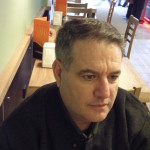John Flynn (Moldova 1993-95) English Language Fellow in Khabarovsk, Russia
John Flynn (Moldova 1993-95) is currently an English Language Fellow with the US State Department in Khabarovsk, Russia. He is living in Khabarovsk, the capital of the Far East, a city of about a quarter of a million people, and teaching at the Far Eastern State University of the Humanities. He believes he is the only American living in Khabarovsk.
His fellowship program is run by Georgetown University and funded by the State Department. John writes, “The program salary is more than adequate and the teaching expectations are higher than if I were just on my own teaching privately. Diplomacy is required and I think my background in the Peace Corps has served me well. I have met other Fellows in other countries and some of them, too, are RPCVs.”
There are today five English Language Fellow in Russia and while the risk is always there, none have been deported, though these are “dicey times for a Yank in Russia.” John says his Russian language skills, which he developed while with the Peace Corps, have helped him.
 One applies to the State Department to teach for at least one year, and a maximum of two. There are also longer and short term English language specialist assignments which would be suitable for any RPCV who has training in TESOL OR ESL, and has had some teaching experience beyond their Peace Corps tour.
One applies to the State Department to teach for at least one year, and a maximum of two. There are also longer and short term English language specialist assignments which would be suitable for any RPCV who has training in TESOL OR ESL, and has had some teaching experience beyond their Peace Corps tour.
The fellowship program is highly competitive requiring a CV and letters of reference. All of the requirements and application forms are available at: http://elprograms.org/fellow/.
While John is located in, as he puts it, “a reasonably challenging place,” the majority of Fellows teach in beautiful cities or towns and at solid universities.
The Fellows that John have met, he writes, “have a good amount of experience as English teachers and intend to make a career of it. An MFA doesn’t hurt in obtaining a Fellowship.”
John certainly came to the Fellowship with more than enough experience, having two certificates of training in TESOL, including a CELTA certificate from Cambridge University, and teaching experience in the U.S. teaching in high school, college, and adult English. One of the schools he taught at was NOVA in Annandale, Virginia, the second largest community college in the country and where Vice President Biden’s wife teaches.
What has impressed John is that this Fellows program is competitive, and there is an expectation that teachers arrive to their sites as experts. Russians are not easily impressed. John has done his best to impress them with a variety of presentations and seminars, as well as teaching regular classes for a minimum of 15 hours per week.
Many of the other Fellows already hold or are working on PhDs. And as he has pointed out, it is an academic program that requires diplomacy. Fellows are answerable directly to the embassy in country, with regular meetings and a mid-year conference. They are expected to maintain contact with an administrative person in DC, at Georgetown, who monitors and manages their expenses and reimbursements.
John’s teaching assignment has been good for him because when he arrived the Russian Ministry of Education announced that it wanted its professors to focus more on academic writing. Now he is teaching seminars to teachers once a week on how academic writing is taught in the U.S.
The Ministry of Education is also impressed that John is a creative writer and has published books to his credit, and that he has been teaching academic writing since 1986. Ironically, while never having taught a creative writing class, he has been able to incorporate creative writing into some of his literature and composition classes.
He has also found that his Russian colleagues are remarkably well read and well-spoken in English, and, that, too, has been demanding for him, as well as, on the other Fellows in Russia.
John also makes the point that “there is no guarantee with these Fellowships that just because you speak a certain language, you will be placed in a country where that language is spoken.”
The mission is to place the most qualified educators in countries where they will meet the needs as expressed by the host country. Fellows are not free to travel about the country and every trip a Fellow makes must be approved by their Regional Language Officer in the Embassy. In this way, it differs greatly from Peace Corps as Fellows are limited in terms of where they can travel and when. They are also assigned to travel to other cities and institutions whereas honored guests they are expected to present seminars and workshops. “It is,” as John sums up, “a challenging job. Not for everyone.”
All the while, John Flynn continues to write and publish. His recent poetry collection, Keepers Meet Questing Eyes (2014) was published by Leaf Garden Press, and a new collection entitled, Restless Vanishings comes on this year also from Leaf Garden. His short story collection, Off To the Next Wherever, will be published this year by Fomite Books.
You can read some of John’s published stories and essays on his website, www.basilrosa.com.
Well done.
Khabarovsk was in my territory when I was the PC Director for the Russian Far East (’94-’96). We lived in Vladivostok and enjoyed visiting Khabarovsk as it was a much nicer city, more progressive and open. Best of luck with your assignment there. I’ll be following your blog! Thanks for undertaking this assignment!!! Its important for Americans and Russians to share!!
Ken Hill